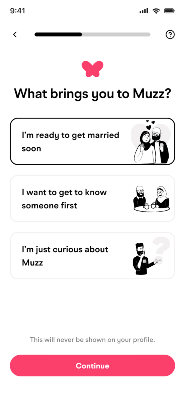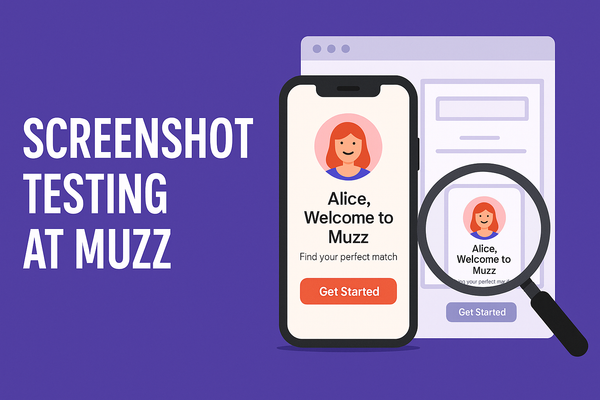What brings you to Muzz? Cohorting users by intent

At Muzz, we collect over 200 million data points every day on how people interact with our product and with each other. At its core, we use these data points to generate insights that help us better match compatible people to one another. Our focus on Muslim matrimony has historically attracted a core user of marriage-minded Muslims, but our rapid growth has led to a broadening of our user base, now attracting a wide range of Muslim users across the spectrum of marriage intent and product intent.
This rapid growth can sometimes lead to problems – users aiming to execute on the app’s core value proposition (find a Muslim to marry) match with those who are interested in less traditional relationships such as dating or are merely curious about the app. This is a pattern seen in other rapidly scaling dating apps (see Feeld, the ‘kink-positive dating app’ whose 30% year-on-year growth has led to a surge in ‘vanilla tourists’, according to a recent article in The Guardian).

It’s a tricky challenge – on one hand, we want to ensure we continue to deliver on our promise to be the world’s best platform for Muslim marriage. On the other hand, we don’t want to needlessly stifle growth – although low intent users are not always compatible with high intent users, their intent may change over time through feature education, comfortability, or a change in personal circumstances. In order to gain a better understanding of user intentions, we decided to add a simple question to the very beginning of onboarding, asking users “what brings you to Muzz?”.
We had one of our data scientists, Levke Ortlieb, generate some behavioural insights to better understand how the different cohorts were using the product after a few weeks of data collection.
[Day 4 retention by sign-up reason and gender – data removed due to sensitivity]
One of our key observations was the difference in retention rates between the user cohorts, with a strong correlation between user intent and likelihood to continue to use the app. Although this is somewhat self-explanatory, it serves as a strong indicator of product-market fit by demonstrating our core userbase’s propensity to use the product for our core value proposition of helping Muslims get married, as opposed to more casual usage typically associated with dating apps that may retain the least serious cohort. This is further demonstrated upon analysis of marriage sentiment in user conversations, with our most serious users being nearly twice as likely to talk about marriage than our least serious users.
We also see similar trends across the product lifecycle; our ‘ready to marry’ cohort are also more likely to successfully complete onboarding, like profiles, and spend more time using the app every day. In some markets, this cohort spends over 25% more time actively using Muzz every day than their most casual counterparts.
When we split retention between male and female users in developed and emerging markets, we noticed an interesting discrepancy with the ‘ready to marry’ cohort of male, emerging market users. As shown in the below graph, this cohort of users are not significantly more likely to retain than the middle cohort, opening up a new area of investigation for the team. Once we better understand why male retention falters in emerging markets for our core userbase, we can address this issue and improve the experience for both male and female users.
[Day 4 retention by sign-up reason and gender in developed vs emerging markets – data removed due to sensitivity]
How else can we use our findings to further optimise the user experience? By asking users about their reasons for signing up, we’ve created a new data point that can now feed into our churn propensity model and our recommender system. This means we can better identify users at risk of churning from the app, and we can better match compatible users to one another. The question also opens up a new opportunity for personalisation – we can educate less serious users about Islamic marriage values and encourage them to use the product in more desirable ways, as well as provide our most marriage-minded users with an experience that aligns even better with their principles and core motivations.





